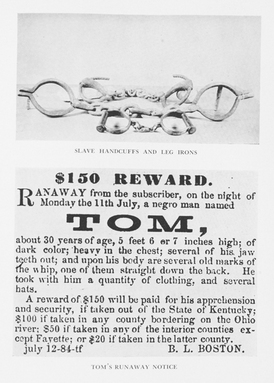
About the Underground Railroad
Life as a fugitive slave:
Some slave owners allowed slaves to escape for enough time to
visit family members
or steal a pig! The slave owners believed if the slaves came back
to work again they could be rewarded. The owner would give the
slave who returned a job he or she would enjoy more. This way,
slaves would be more likely to
stay on the plantation.
When running away to freedom,
slaves
traveled at night to keep from
being seen. If slaves were lucky, they
would be able to find local merchants or townspeople to give them
uniforms to
camouflage them to make them seem like they were free to other
townspeople. Slaves that left the
plantation would
write coded messages back to slaves that were working on the plantation. If decoded correctly, these messages would
determine good “stations” and paths to travel toward freedom. Often the "conductors" allowed slaves to
stay in his or her house, which was considered a "station." Thomas
Garrett helped by giving
fugitive slaves money and a place to stay. Fugitive
slaves lived in constant fear that they
would be caught and placed back into slavery.

Life
as a slave catcher:
Slave
catchers believed that slaves were a beneficial aspect for the southern
economy. Slave catchers often were paid a lot of money
if they sent fugitive slaves back to the plantation. They
searched all night using dogs because of their keen sense of
smell.
Slave catchers had to be detectives and
find any clues that could have helped them find the fugitive
slaves.
Often, slave catchers traveled on horses and
by foot to find slaves quickly. Slave
catchers used rumors of the townspeople as clues to find the
whereabouts of the slaves.

Signs like these often were posted by slave catchers and plantation
owners attempting to find slaves that had escaped. http://maap.columbia.edu/content/places/the_theodore_wright_house/images/274/MAAP_TheodoreWright_Then_274.jpg
